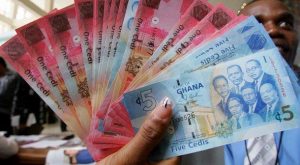 Ghanaians are living under mysterious economic conditions, following a revelation by the Bank of Ghana (BoG) that the fiscal consolidation efforts instituted by the government are on track.
Ghanaians are living under mysterious economic conditions, following a revelation by the Bank of Ghana (BoG) that the fiscal consolidation efforts instituted by the government are on track.
According to the Governor of the BoG, Dr Henry Wampah, total revenue and grants exceeded target while expenditures were broadly on target for the period January-April 2015.
These developments resulted in a fiscal deficit of 2 percent of GDP, within the programme target of 2.6 percent of GDP.
Despite, these positive news majority of Ghanaians are reeling under harsh economic conditions such as soaring prices of basic commodities, inadequate supply of electricity, massive unemployment, poor infrastructure, poverty, among others.
Monstrous Debt-Trap
In a bid to address all the above challenges, the government has resulted into huge borrowing which ballooned the country’s total debt (both domestic and foreign) to GH¢89.5 billion as at the end of May 2015, from GH¢88.2 billion recorded in March, this year.
The debt stock of GH¢89.25billion represents 67.1 percent of GDP. Of the total public debt, domestic debt of GH¢35.7 billion constituted 26.7 per cent of GDP, and external debt of GH¢53.8 billion constituted 40.4 per cent of GDP.
A renowned economist and lecturer at the Ghana Institute of Management and Public Administration (GIMPA), Dr. Raziel Obeng-Okon, Dr. Obeng-Okon, maintains: “As it stands now, the government cannot immediately get out of the debt-trap, because maturing obligations cannot be paid out of its relatively low revenue base.
“Restructuring of the debt from short to long term may bring some respite, but can only be sustainable if the short term relief is combined with strong fiscal consolidation.
“While swapping old debts with new ones, it is important that any surplus of the new debt, over and above the old debt, goes into projects that can pay for themselves. Otherwise, the restructuring would only lead to growing the debt without a corresponding growth in productivity or GDP, leading to a worsening situation of the debt-to-GDP ratio,” he told the newspaper in an interview.
An analysis of the country’s revenue base as a percentage of GDP, and the interest payment as a percentage of revenue, shows that the current level of public debt-to-GDP ratio may not be sustainable.
Given the country’s relatively low levels of revenues, vis-à-vis high and rising expenditure, the high debt-to-GDP ratio may make it more difficult for Ghana, in the medium term, to pay its debts.
This high debt, with its attendant high interest, contributed in creating a panic in the domestic and international markets, and credit rating agencies had to reduce Ghana’s credit rating further downwards. End
Bleak economic story
The bleak economic story of Ghana, since 2013, continued this year, as gross domestic product (GDP) growth is at its lowest in 14 years, and the dollar value of the economy has shrunk considerably until now that it is gaining strengthen.
As if this is not enough, the International Monetary Fund (IMF) has predicted that economic growth would fall to as low as 3.5% this year.
Also, the Ghana Statistical Service’s (GSS) first quarter GDP report for 2015 indicated that the Ghanaian economy dropped from $48.6 billion in 2013 to $38.3 billion in 2014 at market exchange rates.
The drop in the size of the economy in 2014 (over $10 billion), in dollar terms, was due to the exchange rate depreciation, which saw the cedi decline in value by more than 30% against the dollar last year.
Declining growth
This development, according to economists, would have repercussions on the import-dominated economy, lamenting that declining economic growth is bad for incomes and job-creation.
It is also bad for the country, which seeks foreign direct investments (FDIs) for development, as international investors usually look at the dollar value of the size of the economy among other factors, before making decisions on where to invest their money.
Furthermore, the deceleration in growth, as described by the economists and analysts, is more worrying, in the sense that even when the country recorded a high GDP growth, there was jobless growth.
Now that the country is on a low growth trajectory, the economy will continue on the jobless growth trend, while layoffs are expected in the coming years in the country’s public sector, occasioned by the new $918 million IMF bailout programme.
In the international commodity markets, crude oil is projected to average US$52.8 per barrel. Gold prices are projected to average $1,276 in 2015, while cocoa is projected at about US$2,995 per tonne in 2015.
These developments, according to the Bank of Ghana (BoG), would have implications on the domestic economy.
As a result of the fall in commodity prices, the terms of trade are declining widely in the country, while still high inflation and fiscal consolidation will weigh on the country’s growth.
Foreign direct investment inflows were subdued in 2014, reflecting slower growth in Ghana and other emerging markets, and declining commodity prices.
Ghana continues to tap into international bond markets to finance infrastructure projects and refinance debt.
The country returned to the market in July 2014 to issue its third Eurobond worth US$1 billion to refinance debt and fund infrastructure projects in the country.
In addition to this, in September 2014, it went to the market again to raise $1.7 billion in Ghana Cocoa Board (COCOBOD) syndicated loans for the purchase of cocoa beans in the 2014/2015 cocoa season.
Again, Ghana’s Parliament has approved a loan agreement between the COCOBOD and a consortium of international and local banks for an amount of $1.8 billion for the purchase of cocoa beans for the 2015/ 2016 crop season. The loan will enable the company to purchase 900,000 metric tonnes of cocoa for the season.
The facility, according to the government will enable COCOBOD to raise adequate funds to purchase cocoa beans from farmers through Licensed Buying Companies (LBCs) for the 2015 / 2016 cocoa season.
Arrears are a deal breaker
In addition to clearing up existing arrears, the running up of arrears is not permitted under the new IMF programme. The repayment of arrears is positive for the banks. The procure-to-pay system that is now in place should help improve expenditure control at commitment level and in so doing reduce the build-up of arrears, according to Renaissance Capital’s research.
Some of the arrears that need to be cleared are those to the power sector and fuel importers (Bulk Distribution Companies ( BDCs). According to one development finance institution (DFI), the BDCs claim the government owes them $500million. If validated, this will have to be added to arrears. The recent government announcement that it would stop regulating fuel prices will help stem the future accumulation of arrears, according to oil economists.
Tackling the mighty wage bill
The wage bill’s swell to 70% of tax revenue earlier this decade (versus 40% in 2000) is attributed to the unification of the salary structure for all civil servants.
The government plans to further shrink the wage bill by reducing allowances, which account for 20%, and culling ghost workers, who make up another 20%. To this end the government capped fiscal year 2015 wages with the unions; however, the researchers at Renaissance Capital believe a multi-year deal would have been better.
Why government is cash-strapped
Government expenditure on public sector wages, interest on debts, and transfers to statutory funds consumes virtually all domestic revenue collected, leaving very little to transfer to Ministries, Departments and Agencies (MDAs) and Metropolitan, Municipal, and District Assemblies (MMDAs) to meet their goods, services and capital expenditures.
The government thus has to resort to borrowing, or it uses the strategy of not transferring the required payments to the statutory funds, or the required allocations to the MDAs in a bid to reduce the pressure on its finances.
This is what is responsible for the cash crunch in MDAs, some of which owe electricity and water bills, as well as other debts to contractors and suppliers.
Despite all the talk by the government about reducing the pressure of wages, interest and statutory transfers on its finances, it has achieved little so far, and the high expenditure on these items is still continuing.
In addition, the corruption in the system is causing massive leakages of revenue, as various reports of the Auditor-General have shown.
African Eye News.com





